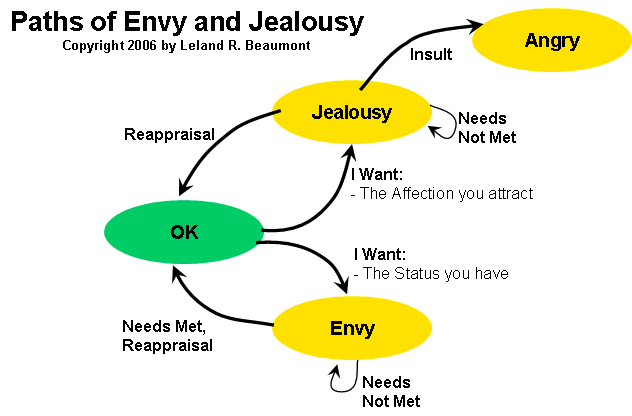You fear your lover will run off with another, you are resentful and you feel jealous. Because this is so hurtful and unfair, you also feel angry.
Definitions

- Feeling unlovable [laz]
- Threat to sexual access.
- Resenting another for your loss of affection or other favor you consider you deserve.
- Displeased about an event desirable for another [OCC]
Related Terms
Jealousy and envy are closely related, and some writers regard them as synonyms. In envy you want what you never had. In jealousy, you are threatened with the loss of something you have (or thought you had). Envy is a two-person emotion; I want what you have. Jealousy is the three-person love triangle, I want who you have.
Origins and Benefits
Jealousy promotes monogamy in sexual relationships. Monogamy makes it easier to identify the father of each conceived child. Clearly identifying the father encourages him to participate with greater involvement in the child's upbringing. Pair-bonding in humans forms an alliance of commitment and cooperation between mother and father that benefits the child, while satisfying the parent's need for sex and other resources. However, human pair-bonding is not perfect. The phrase “mama's babies but daddy's maybes” is supported by DNA tests conducted in Western hospitals. The results suggest about one in fifty children were not sired by the father of record.
Studies show that men are typically more upset by their partner’s sexual relationship with another person, and women by their partner’s emotional involvement with another person. The statistically measured difference is quite significant.
Dangers
Violent sexual jealousy is a distinctive characteristic of males observed in practically all known human societies. The majority of battered women attribute jealousy as the motive for their husband's assaults.
Jealousy Portrayed in Art
In Shakespeare's play Othello, Iago convinces Othello that his wife Desdemona has been unfaithful. As a result, Othello kills his wife in a jealous rage before killing himself.
When Helen of Troy left her husband Menelaus for her lover Paris, Menelau's jealousy lead directly to the Trojan war.
Paths of Jealousy
Understanding what can trigger our jealousy, what separates envy from jealousy, and how we can resolve our jealousy helps us to cope with our feelings. The following figure illustrates choices we have and paths we can take to either prolong or resolve our jealousy. Use this like you would any other map: 1) decide where you are now, 2) decide where you want to go, 3) choose the best path to get there, and 4) go down the chosen path.
You may wish to print out this one-page version of the Paths of Envy and Jealousy map.

This diagram is an example of a type of chart known by systems analysts as a state transition diagram. Each colored elliptical bubble represents a state of being that represents the way you are now. The labels on the arrows represent actions or events and the arrows show paths into or out of each state. You are at one place on this chart for one particular relationship or incident at any particular time. Other people are likely to be in other places on the chart. This is similar to an ordinary road map where you plot where you are now, while other people are at other places on the same map. Begin the analysis at the green “OK” bubble, or wherever else you believe you are now.
OK: This is the beginning or neutral state. It corresponds to yourself being free of envy or jealousy. The green color represents safety, tranquility, equanimity, and growth potential.
I want the affection you attract: Another person has attracted the affections of someone you are romantically interested in. This confirms your fears that you are unworthy of affection and you resent it.
Jealousy: Someone else is attracting the affection of the person meant for you. This is unfair, humiliating, and enraging. If you can't have her, you will make certain he won't have her. You will break this up at any cost. The yellow color represents the discontent you feel.
Insult: The jealousy often turns quickly into anger, known as a “jealous rage” This can happen especially quickly and dangerously. Choose a constructive path out of this anger.
Needs not met: It is likely that your needs will not be met. Perhaps the affection you are seeking can't be transferred to you. Perhaps it was never lost. Staying stuck here is destructive, reappraise and move on.
Reappraisal: You reappraise the situation and recognize you have been mistaken in some way. Perhaps your lover has remained true to you, or perhaps you are better off apart. In any case, you are now content and OK.
Quotations:
- “Men who were indifferent to the potential sexual contacts between their wives and other men are not our ancestors” ~ Buss
References
[laz] Passion and Reason: Making Sense of Our Emotions, by Richard S. Lazarus, Bernice N. Lazarus
[Ekm] Emotions Revealed: Recognizing Faces and Feelings to Improve Communication and Emotional Life , by Paul Ekman , by Paul Ekman
[OCC] The Cognitive Structure of Emotions , by Andrew Ortony, Gerald L. Clore, Allan Collins , by Andrew Ortony, Gerald L. Clore, Allan Collins
Destructive Emotions: A Scientific Dialogue with the Dalai Lama , by Daniel Goleman , by Daniel Goleman
Prisoners of Hate: The Cognitive Basis of Anger, Hostility, and Violence , by Aaron T. Beck , by Aaron T. Beck
Nonviolent Communication: A Language of Life: Create Your Life, Your Relationships, and Your World in Harmony with Your Values , by Marshall B. Rosenberg , by Marshall B. Rosenberg
Our Inner Ape , by Frans De Waal , by Frans De Waal
Evolution of Human Jealousy A Just-So Story or a Just-So Criticism?, 2003, Neven Sesardic , Lingnan University , Lingnan University
Relationship dissolution following infidelity: the roles of attributions and forgiveness, Julie H. Hall, Frank D. Fincham, Journal of Social and Clinical Psychology, Vol. 25, No. 5, 2006, pp. 508-522
|

